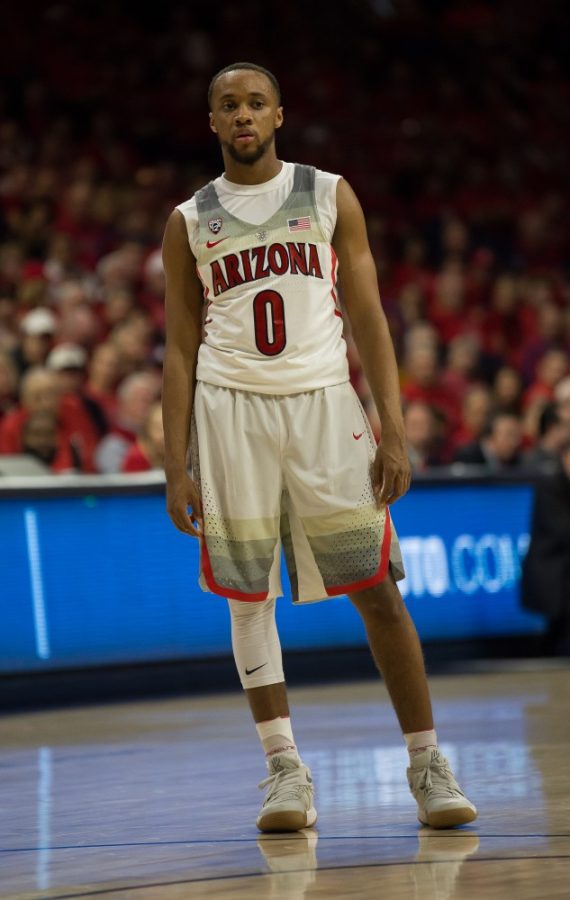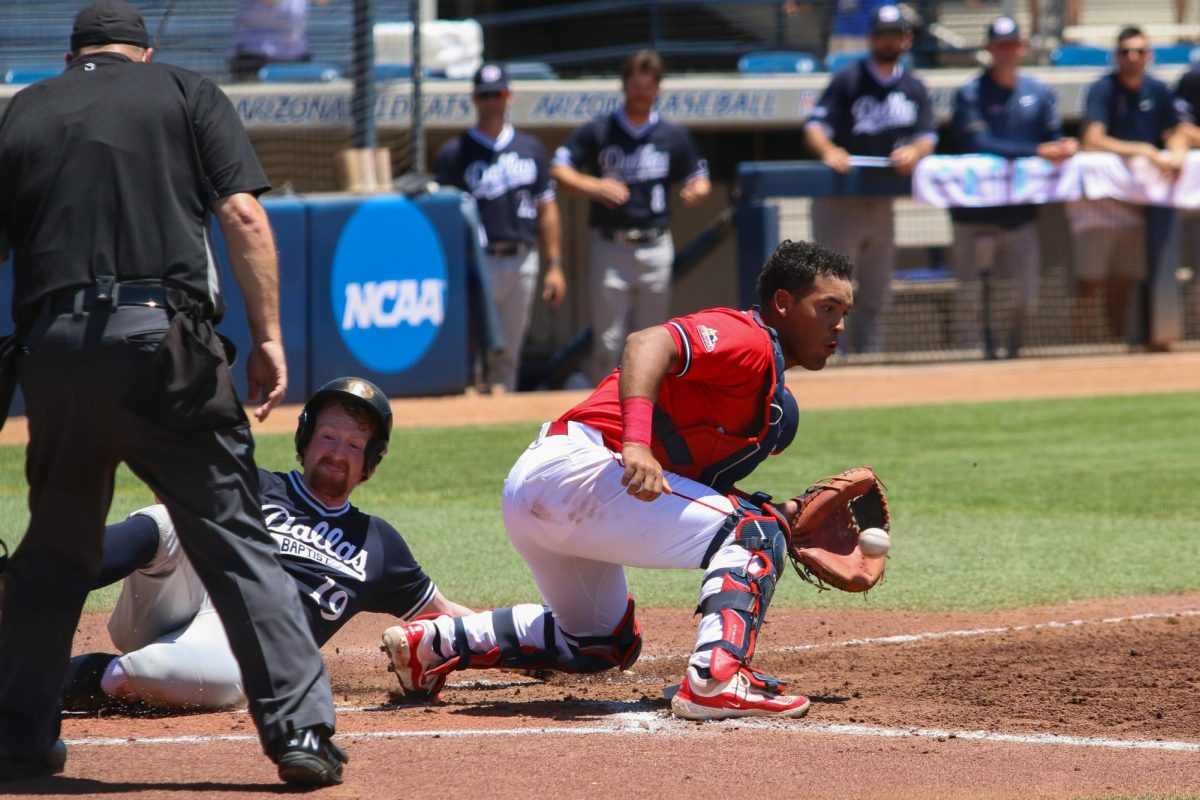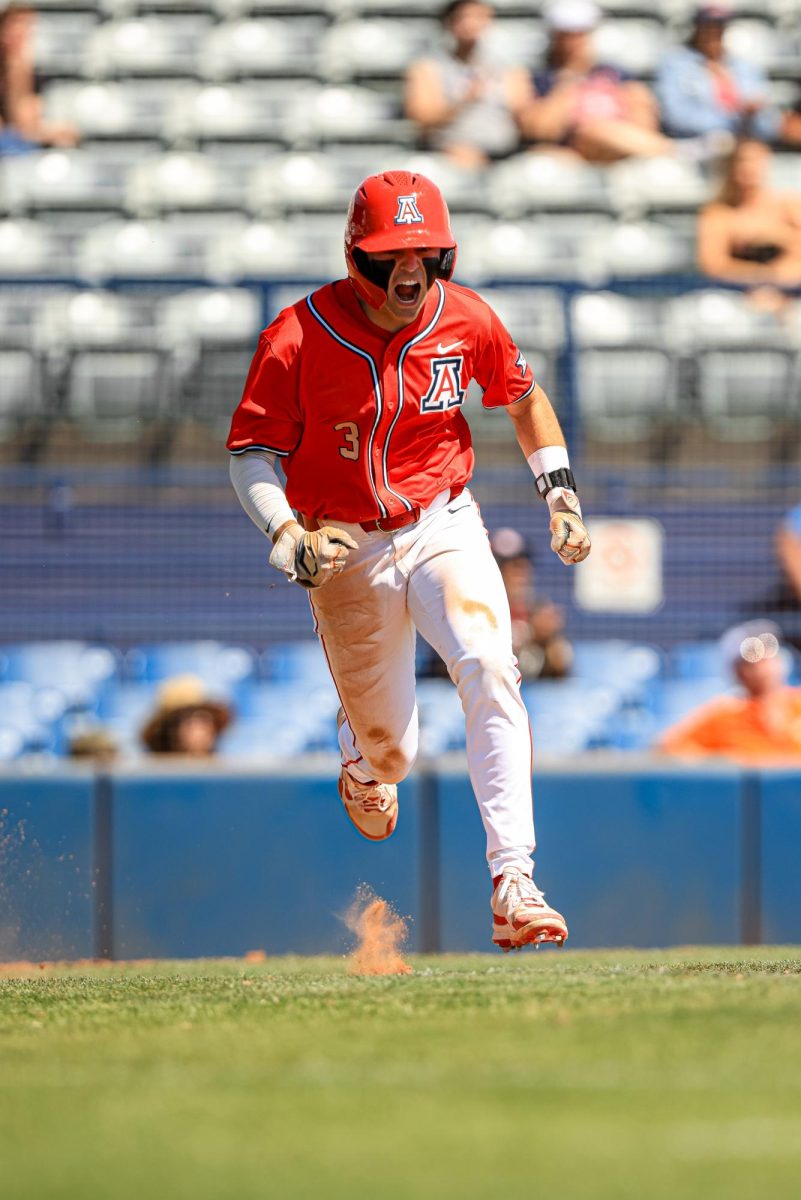Growing up as a kid, Parker Jackson-Cartwright’s go-to activity was playing basketball with marbles.
His parents, Ramon Cartwright and Belinda Jackson-Cartwright, were forced by Parker to draw lines in the carpet to replicate a basketball court so their son could split the marbles into two teams and role-play a basketball game.
Parker constantly applied himself to the game. At a young age he put the marbles in position to set up offensive and defensive sets, as well as play-by-play calls.
Kids who admire the game of basketball have the reputation of playing on tiny baskets that connect to a door or twiddle their thumbs on a game controller playing NBA video games, but Parker was setting up plays on his carpet.
“It was crazy, but it kinda’ speaks to his IQ and how he can see the game so well,” said older brother and former Penn player Miles Jackson-Cartwright.
Coming from Los Angeles, which is arguably the largest hotbed of basketball talent in the country, players from the area normally admired the winning ways of the Lakers and the glamour of Kobe Bryant. During the 2000s era, the Lakers were consistently title contenders so tickets were expensive and the Jackson-Cartwright brothers went the other route and followed the Los Angeles Clippers, L.A.’s other team that was largely viewed as an afterthought of a franchise. They bought $5 tickets to sit in the nosebleed sections, and since the Clippers weren’t necessarily the most intriguing team at that time, they were able to move down and get more than their money’s worth.

Of course Kobe was head honcho of the basketball world in L.A. and was well on his way to stardom, but Parker idolized former Phoenix Suns point guard Steve Nash, who’s known as one of the best facilitators in NBA history, ranking third all-time in career assists.
“He’ll even argue to me today that the best point guard ever is Steve Nash,” Miles said, “And it shows in his game.”
Basketball is more than just a game in the Cartwright household, because Ramon taught Parker and Miles that the court is a canvas and it’s up to them to craft something beautiful.
“To me, basketball is more art than it is athletics,” Ramon said. “It’s ballet with a ball … The most creative artists will emerge.”
Ramon’s approach to the game rubbed off on Parker’s perspective of the game, which molded him into one of the most unique players UA head coach Sean Miller has brought in.
His knack for trying to make other people around him better has been overlooked in his time at Arizona. Considering the plethora of first guards that have made their mark on the program, Parker assumes the role of former Wildcat T.J. McConnell, who thrived on facilitating. McConnell and Parker have parallel styles in their game because they have a pass first mentality, and McConnell went down as one of the best passers to play at Arizona.
Unfortunately for Parker, the gap between him and McConnell is measured in his height more than talent.
“He’s always been the smallest guy in the room and always underestimated,” Miles said.
Being an undersized basketball player presented a challenge because Parker had to put in triple the work to become successful and attacked any player that stood in his way.
“Once he steps on the court, he becomes something else,” Miles said. “Like he will literally cut your throat if you’re across from him.”
On a nightly basis, Parker defied the doubters when he was starting the recruiting process at Loyola High School in L.A. Spectators were in shock, according to his former teammate and assistant head coach at Tucson High School, Alex Ettinger.
“Girls would ask my teammates and ask ‘who’s the best player on the court?’ and they would point to Parker and they’d be like ‘no way, he’s so small,’ ” Ettinger said.
Standing at 5-foot-9, there was no way just playing high school for a few months out of the year would be enough to receive attention from notable schools. So instead, him and his father made the decision to take Parker’s talent to the Amateur Athletic Union (AAU) to expose his playmaking abilities despite his size.

Parker and Ramon were featured in a Netflix documentary “At All Costs”, which focuses on the AAU circuit and how much athletes travel during summer to get college coaches to take notice of their game. Travel teams are built, and all of the elite players band together at camps as if it’s like a tryout for a scholarship.
“It happened at a time when Parker was really uncomfortable in front of the camera,” Ramon Cartwright said. “He sat there a few times and it looked like we were torturing him during the videotaping.”
From a point guard’s point of view or even just a role player’s vantage point, AAU sounds like a turnoff because it doesn’t teach young players the team element of basketball as much.
“I had a great time playing in it until I was in high school,” Ettinger said. “Once I got to high school, everyone played for themselves.”
Ettinger also mentioned that, during the Phenom Camp in his early years, which is an invite only event, the founder of the camp said AAU was the “worst thing to ever happen to basketball.”
UA head coach Sean Miller was wondering who was “making money off of it” during the press conference following Arizona’s win over Utah last week, so AAU is on the teeter-totter of the basketball community.
However, not the Cartwright family. In fact, they are one of the biggest supporters for AAU, because it helps aspiring Division I players who are short on visibility, like Parker, earn scholarships, and Ramon Cartwright especially backs the circuit.
“I love AAU basketball. Always will. I’m probably the biggest proponent of AAU basketball,” Ramon Cartwright said. “The most exciting, the most entertaining, the most engaging level of basketball to me in the world is AAU basketball.”
Cartwright added that he ignored the critics and playing basketball year round was the most important method for Parker to become a better player. It not only improved his game, but he was always in basketball mode to help him focus on receiving a Division I offer.
“These guys who complain about AAU and criticize it, screw them,” Ramon Cartwright said. “They can fuckin’ take a walk as far as I’m concerned, because it’s real basketball. This other stuff is TV basketball.”
AAU has sponsored brands like Adidas and Nike, so when these travel club teams form it’s the coaches of these travel teams’ job to ensure they bring in the right batch of kids to wear the brand. If the next generation of top players are dominating tournaments wearing a certain brand, then the reputation grows for the next generation of young players so it’s a constant cycle putting more money into these corporations’ pockets. The most important note about the cash flow is that the circuit assists into finding free education.
Parker played for the Nike affiliated California Supreme, which exposed him to bigger guards at camps subsequently landing him offers from Arizona, UCLA and USC because he showed his passing ability and team leadership.
“Parker’s greatest skill is the ability to bring people together,” Ramon Cartwright said. “If he’s able to control the intangible thing called chemistry, having a person like that is valuable … I knew how valuable his skill was and how good he was at it and how well he could bring that art to bear.”
Parker knew his time would come at the next level once coaches took notice of what his father alluded to.
“There’s a place for everyone, and that’s how I felt going into AAU and what I can do and what my position is,” Parker said. “I think the coaches that saw me during AAU really took notice of that.”
AAU was important to Parker, but the sibling rivalry with his brother when he was back home in L.A. was where he truly started to develop as a player.
“If you look at the stars in the NBA, the greatest players—the guys we all know and love, a distinct proportion of those guys are little brothers,” Ramon Cartwright said, “they had another sibling in the household that just beat the shit out of them and helped them develop.”
Cartwright was always the one that had to referee their one-on-one battles to make sure they wouldn’t kill each other but push them just enough to have a competitive edge. Miles viewed it as love and respect more than anything.
“It was more of ‘that was my best friend’ and ‘how can I help him be the best player and the best man?,’ ” Miles said. “He helped me become the best man and the best player that I can be as well, and I think that’s what makes our relationship so special.”
Miles is 6-foot-3 and was the big body that helped Parker prepare for Pac-12 Conference battles, because every guard he faced for the most part was that size, but not everyone was buying into him.
Parker understudied T.J. McConnell for one season and then Kadeem Allen the following year. Then once bigger guards flocked in, like Kobi Simmons who is 6-foot-5 and was ranked as the No. 5 point guard on ESPN, many doubted that Parker would receive starter-like minutes.

“We know this whole ranking thing is full of shit,” Cartwright said. “A lot of these guys nationally who are all on ESPN and writing articles and all that, we know these guys don’t know jack shit. They’re just picking the flavor of the month and jumping on the bandwagon and they’ll support whomever.”
It doesn’t matter what the circumstances were, when people doubted him just by looking at his physique, he answered the bell.
“Parker has always relished who’s ranked and who you think is good—bring ‘em in here,” Cartwright said. “You bring him in here and let me play against them. I don’t give a shit who they are … They can bring LeBron [James] in here, but he better be ready to scrap that shit up and be ready to go, because we gon’ go at it fast.”
As much of a tough-minded, fundamentally sound basketball player Parker is, he cared for other players to score even the ones who were green to basketball.
One memory Cartwright shared was in the third grade, Jackson-Cartwright played with a kid who wasn’t coordinated to play basketball, and when the game was basically over with less than a few minutes left to play, he “did everything but lift up this kid and shoot the ball for him.” When the kid finally scored, he didn’t care about his stat line but rather the kid’s two points.
“That says the kind of kid that he is,” Cartwright said. “That says the kind of teammate he is, the kind of competitor he is and the kind of human being he is … Watching that third grader do that let me know that I was doing the right thing.”
From playing marbles on carpet to being on a Netflix documentary to the uphill battle to prove the critics wrong—Parker’s story is more than just putting a basketball through a hole or finding the open man.
It’s about proving the doubters wrong and being a genuine person, which he has shown time after time with his actions. If the Wildcats want to make a deep run in the NCAA Tournament, his grit, IQ and leadership will be a key reason why.
Follow Justin Spears on Twitter.









